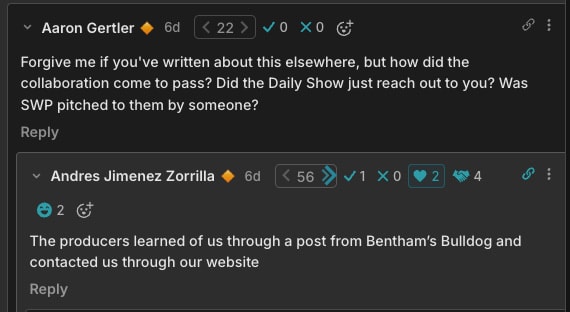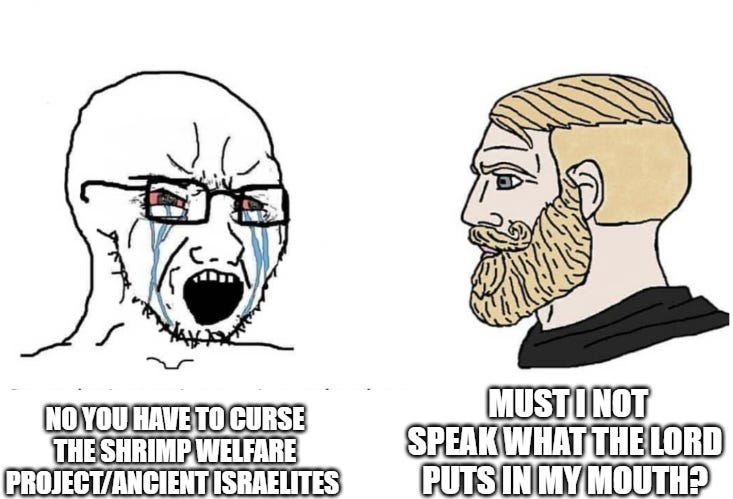Crossposted from my blog.
When I started this blog in high school, I did not imagine that I would cause The Daily Show to do an episode about shrimp, containing the following dialogue:
Andres: I was working in investment banking. My wife was helping refugees, and I saw how meaningful her work was. And I decided to do the same.
Ronny: Oh, so you're helping refugees?
Andres: Well, not quite. I'm helping shrimp.
(Would be a crazy rug pull if, in fact, this did not happen and the dialogue was just pulled out of thin air).
But just a few years after my blog was born, some Daily Show producer came across it. They read my essay on shrimp and thought it would make a good daily show episode. Thus, the Daily Show shrimp episode was born.

I especially love that they bring on an EA critic who is expected to criticize shrimp welfare (Ronny primes her with the declaration “fuck these shrimp”) but even she is on board with the shrimp welfare project. Her reaction to the shrimp welfare project is “hey, that’s great!”
In the Bible story of Balaam and Balak, Balak King of Moab was peeved at the Israelites. So he tries to get Balaam, a prophet, to curse the Israelites. Balaam isn’t really on board, but he goes along with it. However, when he tries to curse the Israelites, he accidentally ends up blessing them on grounds that “I must do whatever the Lord says.”
This was basically what happened on the Daily Show.
They tried to curse shrimp welfare, but they actually ended up blessing it! Rumor has it that behind the scenes, Ronny Chieng declared “What have you done to me? I brought you to curse my enemies, but you have done nothing but bless them!” But the EA critic replied “Must I not speak what the Lord puts in my mouth?”

Chieng by the end was on board with shrimp welfare! There’s not a person in the episode who agrees with the failed shrimp torture apologia of Very Failed Substacker Lyman Shrimp. (I choked up a bit at the closing song about shrimp for some reason).
Now, I don’t know exactly what effect this episode will have. Hopefully it will increase the visibility and effectiveness of the shrimp welfare project and cause large numbers of people to give money to the shrimp community. In expectation, I think such a thing is valuable and important.
I did not expect writing about shrimp to have such a positive impact.
I learned about shrimp welfare from Dustin Crummett at a conference I was at. When I heard that every dollar could prevent 1,500 shrimp avoid a slow and painful death, it seemed obvious that this was an excellent use of money. I later learned that this was an underestimate by an order of magnitude. The shrimp welfare project uses marginal dollars to purchase stunners. These stunners are repeatedly used year after year—so plausibly each dollar prevents more like 15,000 painful shrimp deaths. Just as it would be worth spending a penny to prevent 150 lobsters from being boiled alive, it’s worth spending a penny to make painless over 100 painful shrimp deaths.
When I first set out to write about shrimp, I assumed the article would flop. Who the heck cares about shrimp? Sure there are good arguments for caring about shrimp, but I didn’t expect many people to be persuaded. I expected people to mostly ignore the fact that they could prevent huge amounts of extreme suffering and go about their daily life as before.
Exactly the opposite happened. As of today, 23,000 people have read the article.
wrote about shrimp welfare and donated 1,000 dollars. Scott Alexander linked to it. I had a guest post on
’s blog about shrimp welfare and he also gave 1,000 dollars.
used neglect of shrimp welfare as an example of how people errantly refuse to quantify—and gave 1,000 dollars. Even Garrett Jones, an economist who I’ve been critical of the past for his anti-immigration views—though who is clearly among the sharpest critics of immigration—gave some money to the shrimp.
Across the political spectrum, left, right, and center united against the forces of darkness (shrimp farms + Lyman Stone). In total tens of thousands of dollars were raised for the shrimp welfare project—potentially hundreds of millions fewer shrimp will experience very intense agony before their death. If I get to the pearly gates and St. Peter asks me “what good things have you done in your life,” I will say “I helped lots of shrimp not get tortured to death.”
I think this particular episode illustrates just how important it is to spread good ideas.
There are some ideas that I think are important. It’s important that people try to take high impact careers—that they try to give effectively. It’s important that people take animals seriously. Writing about subjects can feel like shouting into the void. When a person donates because you convinced them to, you rarely hear about it.
My first foray into seriously considering arguments for veganism came from watching Alex O’Connor’s video on veganism. I was 15 at the time. I wasn’t immediately convinced. I first went vegan more than a year after that video. But that video got me to start thinking about the subject, it put a stone in my shoe.
Reading Brian Tomasik’s essays was another thing that solidified in my mind the importance of animals. Reading his harrowing accounts of the horror of extreme suffering made it clear to me that we should do everything in our power to prevent extreme suffering. Suffering isn’t a game or parlor trick; it’s a horrifying moral emergency. The fact that right now a population of animals more than the number of people on earth is starving to death, being eaten alive, being crushed to death, and dying in some other horrible way is a cause for extreme alarm.
Most of the time, changing minds isn’t a quick and neat process. David Friedman once described his aim as being not to persuade people but to give them the arguments with which they will slowly persuade themself. It’s hard to know how my life would have been different if I’d never read Brian Tomasik, Scott Alexander, Richard Chappell, Michael Huemer, or one of the many other authors who shaped my worldview. But each positively contributed to my ability to positively impact the world.
The thing that most solidified in my mind the importance of blasting good ideas into the ether was reading your responses to the survey I sent out recently!
I learned some interesting demographic facts from the survey. For instance, the average SAT score of my readers (I was too lazy to convert other test scores to SAT) was 1515—over 100 points higher than my SAT score! I learned the names of one of my blog readers was “Traditional white male name,” and another was Plato! I learned that 28% of my readers studied philosophy in University. Only 7.6% of my blog readers are female while 12.6% have autism and 18.3% are ethnically Jewish. More of my readers had 1600 SAT scores than the property of being female.
But the most touching thing to read were the testimonials. I asked, in the survey, whether reading my blog articles had changed people’s lives in any significant way. 26.6% of people said that reading my articles had changed their donation choices. It seems a sizeable portion of those people gave to shrimp. Various people said I caused them to go vegan, give to effective charities, take the Giving What We Can pledge, believe in God, and switch their donations around from some effective charities to others. Some of the comments were pretty funny, like:
Even though I'm 49 and you're 11 or 12, you clearly are very smart and it's very gratifying to see how the new generation of philosophical theists is shaping up.
Someone else commented:
You have the advantage of youth. You can get away with a lot. It's good for you to have someone to remind you that you're just a baby. I'm happy to be that person.
(I will not make age an issue of this campaign).
I was pretty surprised by how many people have been convinced to do awesome stuff by my articles. I really didn’t expect it.
People are a lot more likely to leave blog comments if they disagree with an article than if they agree with it. Few people rush to the comments to say “yes, totally agree 100% with this article—I have nothing to add.” This can lead to a sense that basically all of your readers disagree with you.
Take my arguments for the existence of God, for example. I didn’t realize anyone found them at all persuasive. I thought people treated them mostly as cool novelties—a bit like Koko the gorilla speaking. “Hey wait, this guy’s a Bayesian rationalist EA and he believes in God, huh, weird.” But apparently some people find them persuasive occasionally. Cool!
The same is true concerning my charity articles. While I knew that I convinced some people to give to effective charities, I was surprised by just how many people I persuaded. I thought the overwhelming majority of people who read my articles on such subjects were unmoved.
Blasting good ideas into the ether is a slow process. There won’t be immediate returns generally. You won’t usually have a conversation with someone that culminates in them breaking down and declaring that they will give half their paycheck to shrimp from now on. But it really, really matters. Talking with friends, writing blog posts, making YouTube videos to shape public opinion—all of these things are incredibly valuable. So if you’ve been on the fence about starting a blog (provided you’re pro-shrimp, of course, if not then you should not start a blog) I’d encourage you to go for it.
Spreading good ideas can feel like shouting into the void. But sometimes when you shout into the void, the void shouts back “hey, I’m a Daily Show producer—why don’t we do an episode about shrimp welfare.”

Thanks, you too!